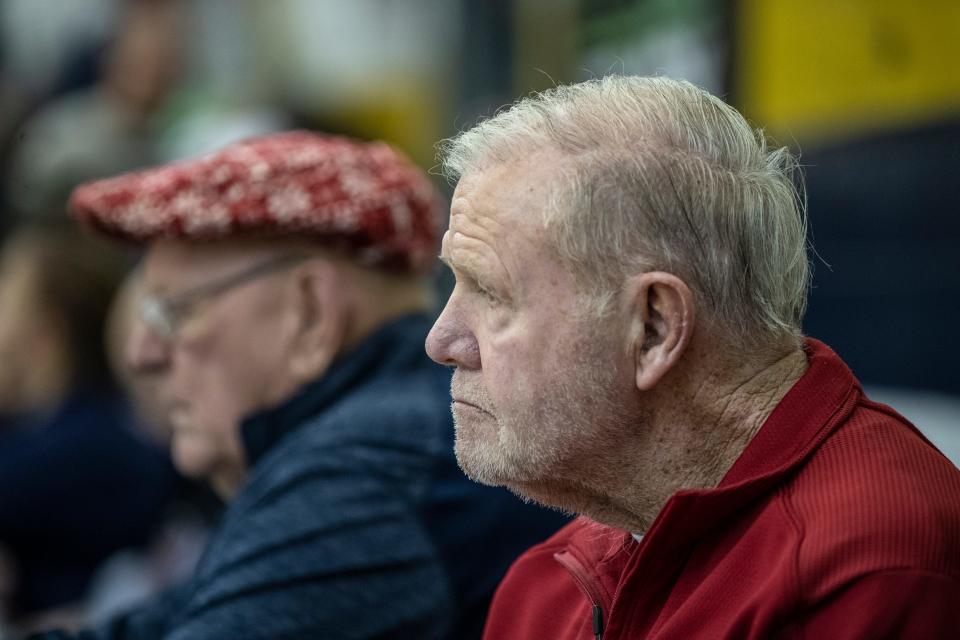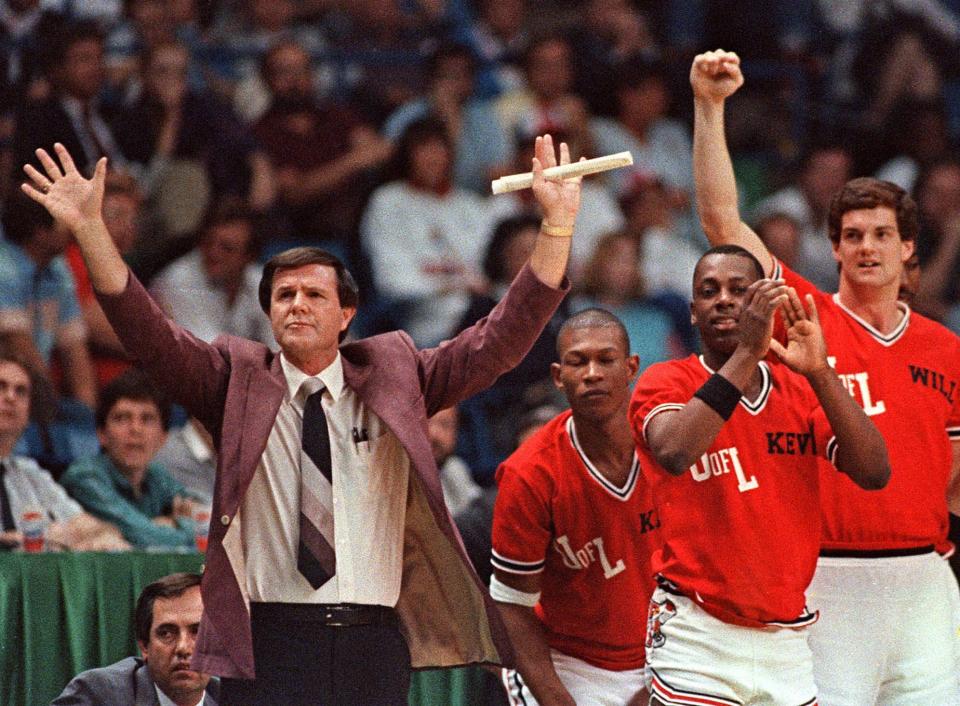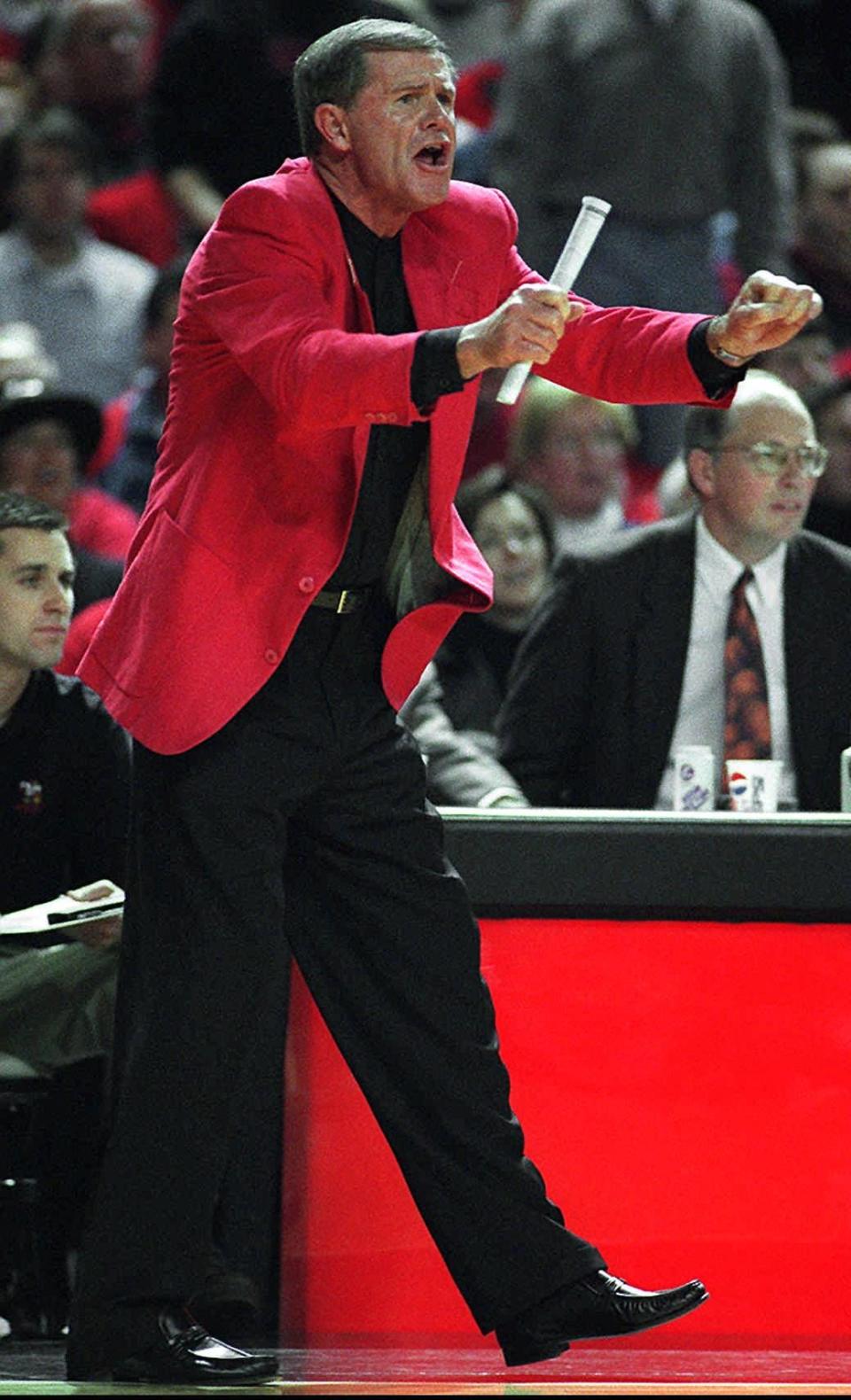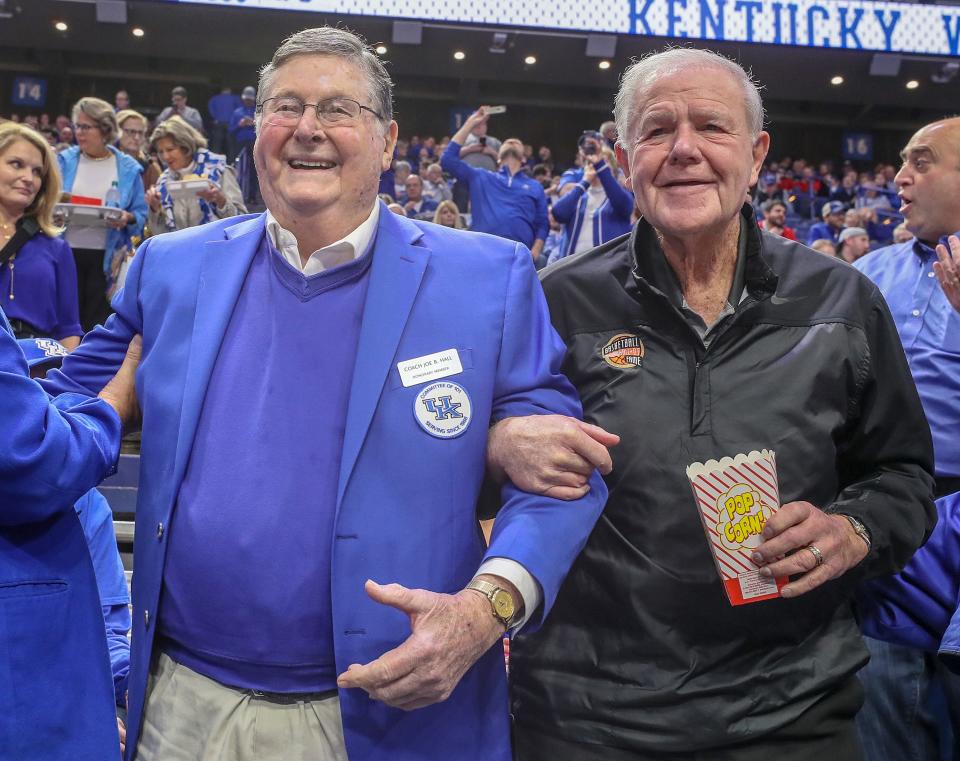Denny Crum, legendary Louisville basketball coach and Hall of Fame member, dies at 86
Denny Crum, the Hall of Fame coach who led the Louisville Cardinals basketball team to six Final Fours and two NCAA championships — and did so in such a calm fashion he was dubbed “Cool Hand Luke,” has died. He was 86.
He passed away at his home Tuesday morning, the university said in a statement.
A Southern California transplant who played and coached for UCLA’s legendary John Wooden, Crum was named national coach of the year three times and was the fastest coach to amass 500 wins after only UNLV’s Jerry Tarkanian.
In his first 15 seasons, he won an astounding 76% of his games, including national titles in 1980 and 1986.
“Today is a sad day for me personally, as well as the basketball world," said current U of L coach Kenny Payne, who played for Crum in the '80s, in a news release. "My thoughts go through all the lessons that he taught, not just to me, but every player he ever came in contact with. Those lessons are still relevant today. We were so blessed to have him in our lives. He was a true treasure who gave so much to (the) university and the community. We must keep his memory alive. My prayers go out to his family and especially Susan."
But Crum, who was enshrined at The Naismith Memorial Basketball Hall of Fame as part of the 1994 class and was again honored at the Springfield, Massachusetts, facility with a granite bench in the Naismith Coaches Circle in 2019, saw his teams struggle late in his coaching tenure.
After the 1986 championship, his teams never advanced to the Final Four and only reached the Elite Eight one more time.
Unable to recruit the caliber of stars he had landed in his glory years, his winning record dipped to 63% in his second 15 seasons. And during his final four years, the team struggled to a record of 61-61.
When did Denny Crum retire from basketball?
He retired with a record of 675-295, a 69.6% winning percentage.
By the numbers: Who is the best player to wear each number for Louisville basketball?

Jay Bilas, the ESPN commentator and former Duke star who played on the team the Cards vanquished in the 1986 title game, said upon Crum’s retirement that his career had been “nothing short of brilliant,” and was “worthy of respect, honor and praise.”
His Cardinal teams dominated the sport in the 1980s. His team won 30 games in three seasons, and he sent 28 players to the NBA.
Crum became the 'face of sports' in Louisville
Al Maguire, the commentator and former Marquette coach who dubbed Crum "Cool Hand Luke," pronounced the Cards a dynasty. Then Courier Journal sports columnist Rick Bozich wrote that after Muhammad Ali, Crum was the “face of sports” in Louisville.
He proved to everyone inside and outside Kentucky that splendid basketball could be played outside Memorial Coliseum or Rupp Arena.
With his rolled-up program, his carefully combed hair and Cardinal red ultra-suede blazers, Crum became a fixture on the sidelines at Freedom Hall.
In a game in which many coaches come and go as the tides, he stayed for 30 years at U of L, declining three offers to return to his alma mater to succeed the legendary Wooden.
By his retirement, he had coached as many seasons as the rest of the coaches in Conference USA combined.
Kentucky's Mount Rushmore: You voted for Kentucky's Mount Rushmore of Sports. Now here's who we picked
Who was Denny Crum? How did he get started in basketball?
Denzil E. "Denny" Crum was born March 2, 1937, in San Fernando, the sprawling Los Angeles suburb.
He said his father, a good high school athlete in his own right, taught him, “Don’t major in minors.” In other words, to pay attention to the present and future and not worry about the past.
He played two seasons at Pierce College, a community college, before transferring to UCLA, where he averaged 7 points a game, then served as freshman coach. After working as an assistant, then head coach at Pierce, he returned to UCLA as Wooden’s top assistant and recruiter.
Crum landed a tall redhead for the Bruins named Bill Walton — arguably the greatest college basketball player of all time — and the team won national titles in all three of Crum’s seasons as Wooden’s assistant.
He was hardly intimidated by the "Wizard of Westwood," as Wooden was known. In Crum’s last game, the 1971 championship against Villanova, the young assistant was seen on national TV arguing strategy with Wooden.
When did Denny Crum join the Louisville basketball staff?
Hired by Louisville from a field of 30 applicants at age 34, Crum continued to show his moxie. Before he coached his first game, he trash-talked the University of Kentucky, which wouldn’t play the Cards at the time.
“If UK puts themselves so far above us in their mind, that’s their hang-up,” Crum told reporters in May 1971. “I guess they don’t want to get beat.”

Crum inherited a program from Coach John Dromo that was good but not great. Louisville hadn’t been to the NCAA tourney since 1968, a Final Four since 1959, and had never won a national championship.
Crum’s team lost its first game but he led the Cards to the Final Four in his first season, only to lose to UCLA and Wooden in the national semifinal.
Crum liked to say he had only two rules for his players: Go to class and be on time. He set no curfew or restrictions on drinking or smoking.
Russ Smith: Louisville retires the jersey number of Cardinals legend with ceremony
“What do you do if they break the rule?” he asked The Courier Journal’s Dave Kindred during his first season. “You back yourself in a corner. So I tell my players do nothing that is not in the best interests of the team.”
Bill Olsen, who served as assistant to Crum for nine years and later was athletic director, said Crum respected his players and didn’t shout at them from the bench.
“They were coached so well in practice that in games he could turn them loose and let them play,” Olsen said. “Under pressure, they were poised. They were a reflection of him.”
But beneath his cool demeanor, he was a fiery competitor.
“He hated to lose in anything — basketball, golf, fishing, poker,” said Craig Hawley, who played for Crum from 1986-90. “That competitiveness was reflected in his best teams and fueled his Hall of Fame career.”
Denny Crum's in Sports Illustrated, media coverage
The late Billy Reed, who covered Crum for Sports Illustrated and The Courier Journal, wrote in a column that Crum always looked for edges.
“Edges in golf, cards, pool, horse racing, fishing, you name it, but mostly, edges in basketball games,” Reed wrote. “Not sharp edges, but little ones. He works officials, but doesn't abuse them, in the hope of getting the big call at the end of the game.”
“And once he gets the edge,” Reed said, “forget it. You belong to him.”
Olsen said Crum was so competitive that when French Lick star Larry Bird refused to come to Louisville for a campus visit, Crum challenged him to a game of HORSE in his high school gym. If Crum won, he said, Bird had to come. Bird smoked him, Olsen said, and Bird never came to Louisville.
Unlike many coaches, Crum had a life outside of basketball. He bred horses and golden retrievers on his 55-acre farm in Jeffersontown, collected Louis L’Amour novels, hunted and fished, including from his ranch in Eastern Idaho.
During one summer vacation, he claimed to have shot an 8-foot-8 Alaskan brown bear. “I tried to sign him,” Crum said, “but I couldn’t get close enough to get the pen in his hand.”
Crum brought some tactics with him from UCLA, including a frenetic full-court zone press and a half-court man-to-man in which defenders switched on every pick and screen.
Like Wooden, Crum insisted that a player who scored on a pass immediately acknowledge the player who made the assist, as a way to build teamwork and camaraderie.
But while Wooden won with towering centers, such as Walton and Lew Alcindor, later known as Kareem Abdul-Jabbar, Crum sought out big guards, whom he would “invert” — deploying them closer to the basket where they could exploit smaller adversaries.
Crum also elected to play tough opponents early in the season so his team would be ready for the conference tournaments.
"You didn't want to play Louisville in March,” Dick Vitale once said.
Crum’s methods worked. He took his team to the NCAA Tournament 23 times.
The 1979-80 season, however, did not look like it would be one of them. Three games into the campaign, star forward Scooter McCray went down with a season-ending injury. Crum told friends the Cards would be lucky to win 15 games.
'He provided hope': Howard Schnellenberger resurrected a U of L program on brink of shut down
But freshman Rodney McCray ably replaced his brother, and senior Darrell Griffith earned player of the year honors as the Cards roared to a 33-3 record and the Final Four.
Led by Griffith, the colorful and high-flying Cardinals — dubbed the “Doctors of Dunk” — who popularized the “high five” and spoke to one another in pig Latin — fittingly defeated Crum’s alma mater, UCLA, to win Louisville’s first national championship.
Olsen said the 59-54 victory was Crum’s most significant accomplishment. It nearly doubled the sale of basketball season tickets and the extra revenue allowed the school to save its football team and ramp up the rest of its athletic program.
Denny Crum leads Louisville through NCAA
Crum then led Louisville back to the Final Four in 1982, 1983 and 1986, when it was matched against Duke in the title game.
Led by freshman Pervis Ellison along with two prized recruits from Camden, New Jersey — Billy Thompson and Milt Wagner, the so-called Camden Connection — Crum won his second title.
Revisiting history: Courier Journal celebrates 30th anniversary of 1986 championship with three-part series
In a brilliant strategic move that may have saved the win, Crum assigned Jeff Hall, a skilled shooter not known for his defense, to guard Johnny Dawkins, whom the Cards had not been able to contain in the first half.
Crum joined Indiana’s Bobby Knight as the only active coach with two titles.
Crum said the second national title was better than the first.
“It showed I belonged,” he said.
But Crum never brought the Cards back to the Final Four.
In 1990-91, the team suffered a losing season, at 14-16. In 1997, its record collapsed to 12-20, the worst in the proud program’s history at the time.
The Courier Journal then reported that over nine seasons, only six of Crum’s 37 scholarship players (16%) graduated in the time period expected by the NCAA.
That was followed by a series of NCAA recruiting scandals.
Wes Unseld: U of L legend remarkably strong, singularly unselfish in basketball and life
First, in 1996, the NCAA placed Louisville on probation for two years after the newspaper reported star center Samaki Walker was driving around town in vehicles owned by a booster.
Three years later, the NCAA imposed a postseason ban on the Cardinals after paying for a hotel room for a player’s father. The ban was miraculously reversed on a technicality when Louisville’s lawyer showed the school hadn't received adequate notice that it could be charged as a repeat offender.
Still, Crum’s reputation was tarnished, and his team wasn’t winning as it once did.
Experts offered a variety of explanations.
Olsen said the decline began with the rise of AAU basketball, especially in the South, which brought more attention to players and made it harder to slip and steal high school stars like Lancaster Gordon and Charles Jones, both of Mississippi.

Then, in 1989, Tennessee lured away Crum’s top assistant and recruiter, Wade Houston and along with him, his son, Ballard High School phenom Allan Houston, who went on to become the Volunteers' all-time leading scorer and later a star in the NBA.
With the rise of the Big East Conference, founded in 1979, Crum lost his ability to pick off future stars like the McCray brothers, of Mount Vernon, New York.
"We used to make a living with kids that we thought were good athletes, mostly in the South, where football was dominant,” Crum said in a 1998 interview. “But today, with all the camps and all the services that write about all the players, it's hard to find sleepers.”
Critics blamed Crum himself for some of the declines.
They said he was slow to embrace the 3-point shot, adopted by the NCAA the season after the Cards won the 1986 title.
He also began to lose top local recruits like Doss High School’s Derek Anderson, who went to Ohio State before transferring to Kentucky.
Recruiting analysts also told The Courier Journal that Crum was no longer as visible as other coaches at camps and high-profile all-star games.
Halfway through what turned out to be his final season, athletic director Tom Jurich declined to give Crum a vote of confidence and months of sniping between them ensued. Finally, on March 2, 2001, his 64th birthday, with one game left in a 12-19 season, Crum announced he was retiring.
He denied he’d been forced to leave. "I'm going because I want to," he said at a news conference.
Softening the blow, the university agreed to pay him about $7 million, including $338,000 a year for 15 years as an assistant for development, plus $2 million under the termination clause in his contract.
Entering retirement: Kenny Klein feels 'blessed' for 39 years with Louisville athletics
Writing on ESPN.com, Bilas lamented that Crum “could not exit gracefully in a storybook ending.”
Bozich wrote that Crum’s career at U of L started so hot that decline was inevitable. “Crum could not compete with Crum."
Still, even in the 1990s, Crum took the Cards to the NCAA Tournament eight times and had four 20-win seasons.
Denny Crum's career wins as Louisville coach
He finished his career with 675 wins, which at the time was 14th on the NCAA career list. When he retired, only one Division I coach, Jim Phelan of Mount Saint Mary’s University, had coached longer at a single school.
"He embodied what a coach should be: he cared deeply about his players, he worked tirelessly for his university, he espoused the right values and stuck to them and he lived each and every day for his family," U of L athletic director Josh Heird said in a news release. "Coach gave his heart and soul to this university and this community and he will forever be a part of our past, present and future. Our prayers are with his wife, Susan, and the entire Crum family."
Crum stayed in Louisville, with his wife, Susan Sweeney Crum, the reporter and anchor he’d married in 2001. He was married twice before and had three children — Cynthia and Steve, from his first marriage, and Scott from his second.
Starting in 2004, Crum co-hosted a popular radio show for 10 years with an unlikely partner, his erstwhile adversary, UK coach Joe B. Hall, who died in January of 2022 at the age of 93.

And he continued to lend his name and time to charitable causes as well as making unannounced visits to Card fans in hospitals and nursing homes, for which he never sought publicity.
“He made a lot of people happy,” Olsen said. “He did it because it was the right thing to do.”
Despite two strokes in his later years, the second in 2019, Crum continued to be present. He was there when one of his former players from the 1986 championship team, Kenny Payne, arrived in Louisville to take over the program in March, 2022.
Crum was honored with a new Hometown Heroes banner in March on the Whiskey Row Lofts building. Crum had a banner before, but it had been taken down due to construction.
In 2007, the floor at Freedom Hall was named Denny Crum Court in his honor. In September, Crum attended the dedication of Denny Crum Hall. Heird called the $23.5 million facility "first in class," and Payne said the project "represents Denny Crum excellently."
The building, across Floyd Street from the Planet Fitness Kueber Center, the U of L basketball practice facility, is home to the men's and women's basketball teams, along with other students.
Crum sat for photos with attendees at the dedication. Payne said Crum "changed my life" and said that he talked sometimes to the current Cardinals about Crum's place in program history.
“I'm a believer in, I want them to ask questions,” Payne said. "But there will be days when I talk about the years that I was here, the years before me, the years after me and what (Crum) established, which is the foundation and the tradition of Louisville basketball.”
In October, Crum attended Louisville Live, the Cardinals' celebratory tip-off to the season.
Fans adored him and would burst into ovations when he appeared on the big screen during games at the KFC Yum! Center, where the Cards moved in 2010.
Al Maguire once said Crum was underrated because he didn’t seek attention for himself. Billy Reed said he would have garnered more fame if he weren’t so “depressingly normal.”
But Crum made Louisville a destination job for head coaches and showed the Cards could compete for national championships.
“When he has at his best, nobody was better,” Bilas wrote when Crum retired. “And he was at his best for a long, long time.”
This article originally appeared on Louisville Courier Journal: Denny Crum dies: Hall of Fame Louisville basketball coach honored
